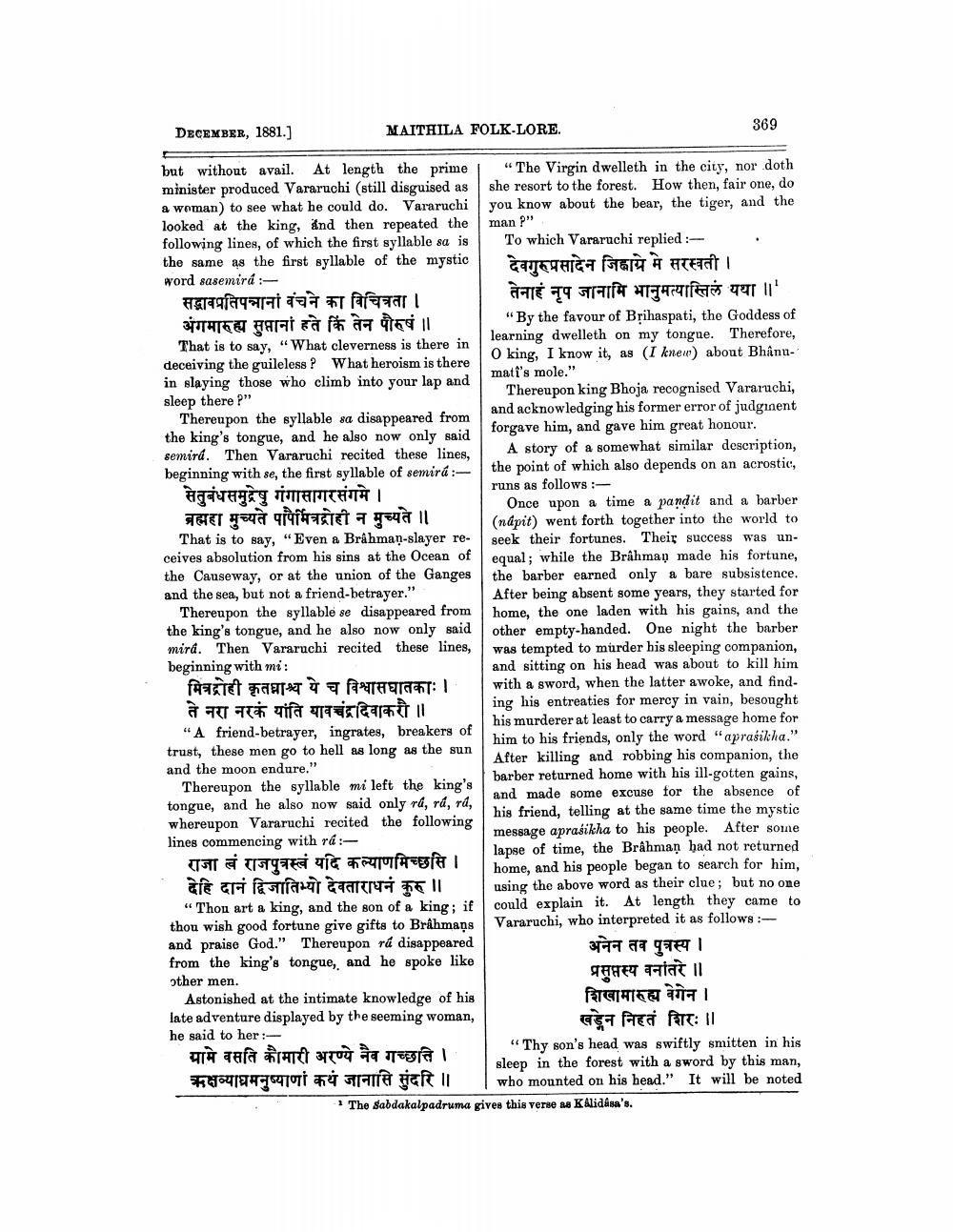________________
DECEMBER, 1881.]
MAITHILA FOLK-LORE.
369
but without avail. At length the prime "The Virgin dwelleth in the city, nor doth minister produced Vararuchi (still disguised as she resort to the forest. How then, fair one, do a woman) to see what he could do. Vararuchi you know about the bear, the tiger, and the looked at the king, and then repeated the man P" following lines, of which the first syllable sa is To which Vararuchi replied :- . the same as the first syllable of the mystic देवगुरुप्रसादेन जिह्वाग्रे मे सरस्वती । word sasemirá सद्भावप्रतिपन्नानां वंचने का विचित्रता ।
तेनाहं नृप जानामि भानुमत्यास्तिलं यथा ।।' अंगमारुह्य सुप्तानां हते किं तेन पौरुषं ॥ "By the favour of Bțihaspati, the Goddess of That is to say, “What cleverness is there in
learning dwelleth on my tongue. Therefore, deceiving the guileless? What heroism is there
O king, I know it, as (I knew about Bhanuin slaying those who climb into your lap and
mati's mole." sleep there ?"
Thereupon king Bhoja recognised Vararuchi, Thereupon the syllable sa disappeared from
and acknowledging his former error of judgment the king's tongue, and he also now only said
forgave him, and gave him great honour. semirá. Then Vararuchi recited these lines,
A story of a somewhat similar description, beginning with se, the first syllable of semirá :
the point of which also depends on an acrostic, सेतुबंधसमुद्रेषु गंगासागरसंगमे ।
runs as follows:
Once upon a time a pandit and a barber ब्रह्महा मुच्यते पामित्रद्रोही न मुच्यते ॥
(ndpit) went forth together into the world to That is to say, "Even a Brahman-slayer re- seek their fortunes. Their success was unceives absolution from his sins at the Ocean of
equal; while the Brâhman made his fortune, the Causeway, or at the union of the Ganges the barber earned only a bare subsistence. and the sea, but not a friend-betrayer."
After being absent some years, they started for Thereupon the syllable se disappeared from home, the one laden with his gains, and the the king's tongue, and he also now only said other empty-handed. One night the barber mira. Then Vararuchi recited these lines, was tempted to murder his sleeping companion, beginning with mi:
and sitting on his head was about to kill him मित्रद्रोही कृतघ्राश्च ये च विश्वासघातकाः।। with a sword, when the latter awoke, and find. ते नरा नरकं यांति यावच्चंद्रदिवाकरौ ॥
ing his entreaties for mercy in vain, besought
his murderer at least to carry a message home for "A friend betrayer, ingrates, breakers of
him to his friends, only the word "aprasikha." trust, these men go to hell as long as the sun
After killing and robbing his companion, the and the moon endure." Thereupon the syllable mi left the king's
barber returned home with his ill-gotten gains,
and made some excuse for the absence of tongue, and he also now said only ra, rá, rá,
his friend, telling at the same time the mystic whereupon Vararuchi recited the following
message aprašikha to his people. After some lines commencing with rá: राजा वं राजपुत्रस्त्वं यदि कल्याणमिच्छसि ।।
lapse of time, the Brâhman had not returned
home, and his people began to search for him, देहि दानं द्विजातिभ्यो देवताराधनं कुरु ॥ using the above word as their clue; but no one “Thou art a king, and the son of a king; if could explain it. At length they came to thou wish good fortune give gifts to Brahmaņs Vararuchi, who interpreted it as follows:and praise God." Thereupon rá disappeared
अनेन तव पुत्रस्य । from the king's tongue, and he spoke like other men.
प्रसुप्तस्य वनांतरे॥ Astonished at the intimate knowledge of his
शिखामारुह्य वेगेन । late adventure displayed by the seeming woman,
खड़ेन निहतं शिरः॥ he said to her:ग्रामे वसति कौमारी अरण्ये नैव गच्छत्ति । |
"Thy son's head was swiftly smitten in his
sleep in the forest with a sword by this man, T45410T - VER II who mounted on his head." It will be noted
The sabdakalpadruma gives this verse as Kalidasa's.




